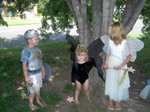 I started this post by searching the Internet for some good pictures of bierocks. The first link I went to had two pictures, one uncut and one cut. The website is a review of Lauck's Bakery and they have this supporting information;
I started this post by searching the Internet for some good pictures of bierocks. The first link I went to had two pictures, one uncut and one cut. The website is a review of Lauck's Bakery and they have this supporting information;"What is a bierock? A bierock is really a baked bun filled with beef, cabbage, onion and seasonings. According to "bierock history", it came from German-Russian immigrants and eventually made its way to the Midwest, especially in the states of Kansas and Nebraska. Interestingly enough, it is called a Bierock in Kansas but a Runza in Nebraska."That being said, we need to add "Runza" to the list of names.
I'll take a look at Runzas first: This from the Runza Restaurant in Nebraska
"It's homemade dough, stuffed full of ground beef and spices, and then baked
fresh every day."
This one does not contain cabbage.
From The Gazette out of Colorado Springs, Colorado: Local deli offers European bread treatsWhatever you call it, a runza/bieroch is interchangeable. Both have
German-Russian roots going back to the 18th century. The term “bieroch” comes
from the Russian word “pirogi” and is the name for any food consisting of a
filling stuffed into dough. “My grandparents were Russian, and they called the
stuffed breads ‘runza.’ However, when Germans lived in Russia, they started
calling runza ‘bieroch.’ And when the Germans were sent back to Germany, the
‘bieroch’ name stuck.”
Now some very interesting history from the Chef2Chef Culinary Portal: Runzas History
Runzas are known by a variety of names and the original recipes were brought to the new world by Russian-Germans emigrants. They are called"Bierocks" by the Molotschna German Mennonites, were bread pockets amply filled with a mixture of ground beef, onion and cabbage. A little like a hamburger sandwich they made a handy meal, were served hot or cold and made ideal traveling companions for trips or picnics.-The word Bierock is related to the Turkish word "Berok or Boerek". Today,in the Crimean city of Simferopol (where Mennonites went to school or went shopping) they are called cherbureki and sold on the street. Simferopol is proud and passionate about this meat pie.-People all over the world serve meat filled bread. England has its Cornish Pasties (which are very good). Italians make calzones (pizza in a pocket). The Polish fill pirogi with ham and cabbage. Turks love a combination of lamb, tomato paste and pine nuts in their bread. The Volga Germans from Russia, neighbors of the Mennonites had their Krautbrot or Krautrunzen. Bierocks, Krautbrot, Krautranzen or Runza or what ever the name is still a favorite with the German-Russian families in Canada and the United States.-Clayton Schmitt Mail = schmittc@chiriqui.com Boquete, Chiriqui Republic of PanamaPosted to MC-Recipe Digest by valerie@nbnet.nb.ca (valerie) on May 2, 1998
The information above falls more inline with what I had first heard. Looking at information on the Internet I find that it depends on where you look as to what information you find. I personally tend to think that the term bierock was used more by the GR from the Molotschna colony. I'm really not clear on where the term runza came from. The Runza Restaurant was founded in 1949, so it's been in use in Nebraska at least that long. The pirogi actually appears to be more like a ravioli, being a boiled pastry rather than baked bread dough.
What do you think?













